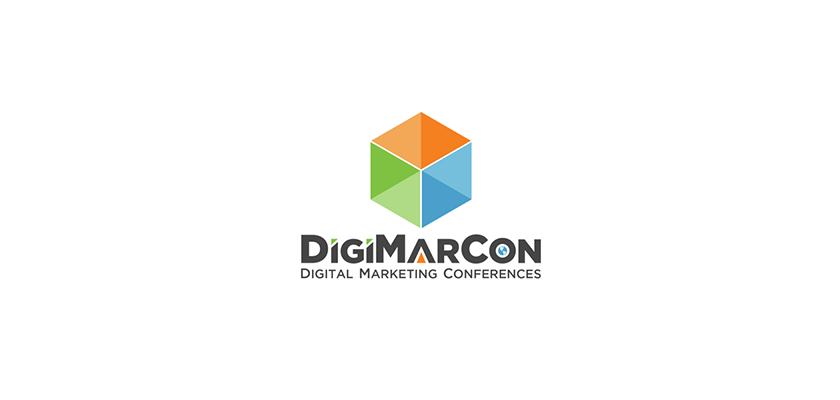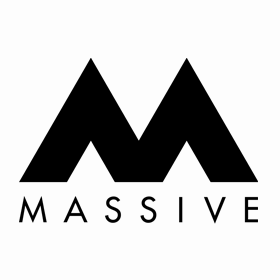
Digital Marketing for EdTech in 4 Steps: Start Attracting More Students Today
Most probably, everyone immediately accepts that the more people you reach, the better it gets for your business. And it is the same for the EdTech landscape, obviously. But, how can you manage not to spend your precious treasure -yes, of course, I mean your budget- on unrelated people who never ever think about benefiting from the goods of EdTech?
Digital marketing is the only and also the most affordable way to do so. When it is compared to traditional marketing methods, digital marketing for EdTech literally kills it by reaching out to the most related people, who will be turned into clients with the right moves done.
You know that your target market is already online and loves spending time diving into the Internet. Whether you offer a variety of courses focusing on different areas as Coursera and Udemy do or provide an educational service regarding only a niche like language learning, it doesn’t matter; people should know that you are into digital trends and leveraging them, such as microlearning with short and focused lessons that can easily fit into the busy schedules of today’s people.
The growing importance of community in EdTech is another significant digital trend, with platforms increasingly prioritizing community-building features like forums and group projects to enhance student support and engagement. When it comes to community engagement, wisely utilizing social media cannot be an ordinary step in digital marketing for EdTech, as it’s like the heart of engagement. This way, your audience not only gains brand awareness but also trusts your brand due to your digital skills demonstrated through digital marketing.
Another key player to always be close friends with is artificial intelligence. Both in digital marketing and your EdTech endeavors, such as personalized learning and adaptive assessments to make education more engaging and relatable, you should be leveraging AI to increase your level of digitalization while decreasing your costs.
After an overview of the digital world of and digital marketing for EdTech, we assume that you are more than ready to get the key takeaways step by step.
Let’s go.
1.SEO Optimization and Solid Digital Presence
How do you stand out in a sea of information? The answer is high-quality search engine optimization.
Sitemaps for Easy Navigation
They lay out all the pages in a web of easy-to-follow trails for both the curious eyes of users and the analytical minds of search engines.
Udacity provides an excellent example of an effective sitemap, which is both simple and elaborate. Each landing page is mapped out with precision and purpose, ensuring that whoever ventures onto their site—be it a keen learner or a Google bot—finds their path sprinkled with the right keywords.
Here’s the beginning of their sitemap, but if you like to see more of it or any website’s sitemap, add “/sitemap.xml” after the URL and dive deeper!

Relevant Keyword Strategy
Regularly publishing new content containing relevant keywords is essential in digital marketing for EdTech. Using medium-tail and long-tail keywords helps in targeting more specific queries, which is a strategy seen in many leading EdTech providers.
For example, if you’re offering online language courses and aim to rank at the top of the SERPs, consider using SEO tools such as Semrush, Ahrefs, or Moz to evaluate metrics related to keywords most relevant to your brand, like difficulty and global volume.
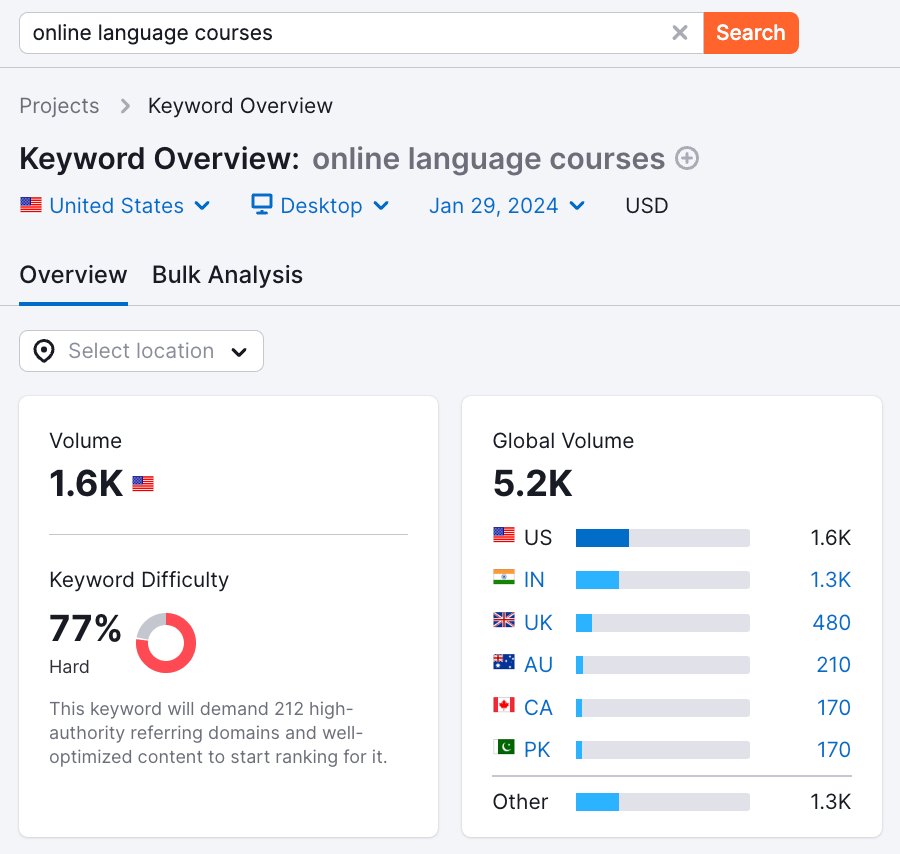
Below, you can see how the first results page on Google is dominated by online education giants for the “online language courses” search:
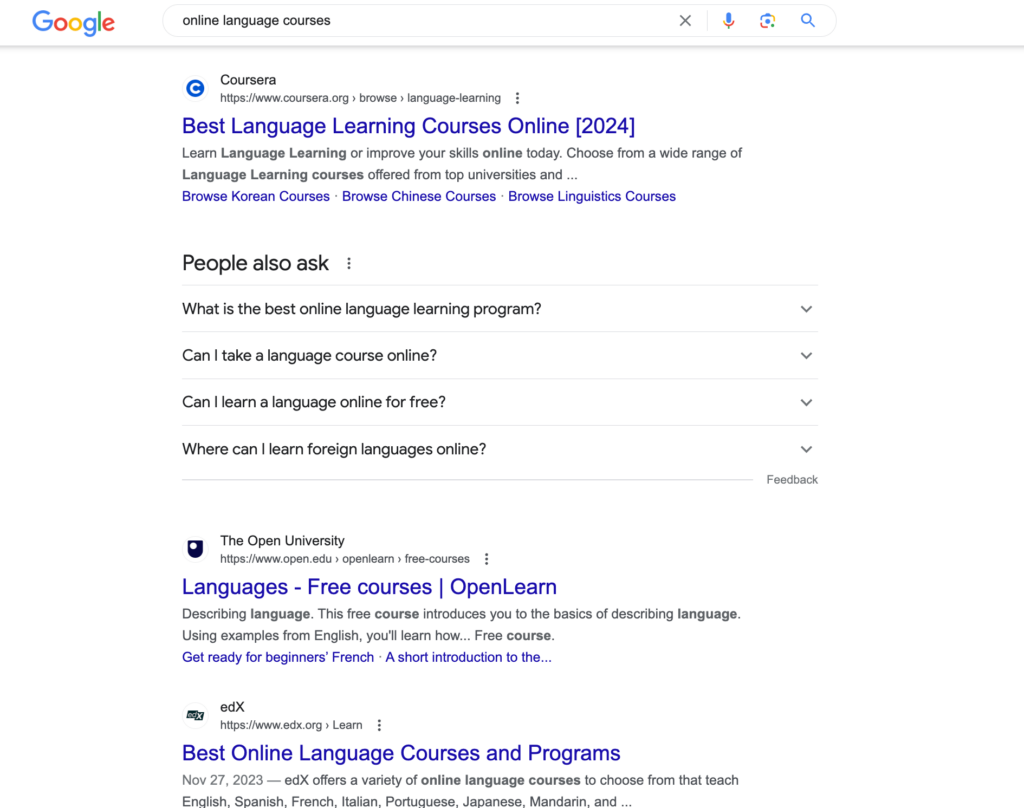
Also, integrating frequently asked questions as keywords and providing your audience with well-thought-out and deep answers is critical. (And, as you can see below, there are also keyword variations that you can think about incorporating into your content.)
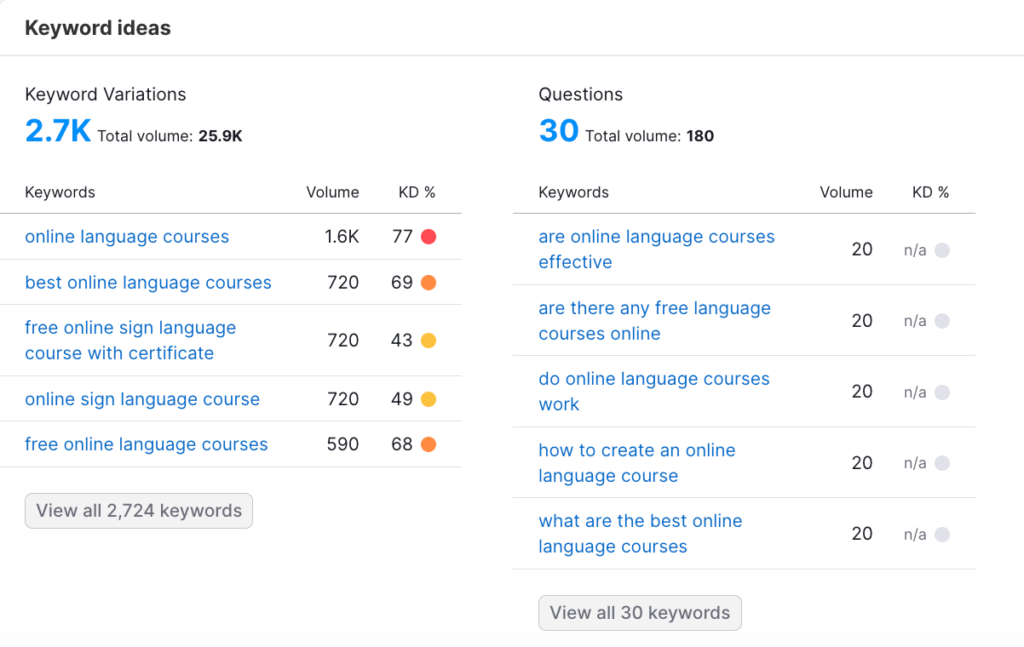
Technical SEO
When it comes to mastering technical SEO, key aspects such as speeding up page loading times, ensuring your site is mobile-friendly, implementing structured data, and using SEO-friendly URLs are vital. You need these elements to boost your site’s search rankings and provide a smooth and accessible user experience.
You should also speed up your page loading time. If your website has a short loading time, you can keep visitors engaged and reduce bounce rates. As a result, you’ll be signaling to search engines that your site is valuable and worthy of a good ranking!
Techniques such as optimizing image sizes, reducing server response times, and minimizing the use of blocking resources can significantly cut down loading times.
Another key aspect of technical SEO is using SEO-friendly URLs, which means keeping your URLs clear, concise, and descriptive. So, avoid long strings of numbers or characters, and instead, use words that clearly indicate the content of the page.
User-Friendly Pages
Creating user-friendly pages is a cornerstone of web design, especially for platforms focused on education and online learning, not to cause frustration and lead potential learners into taking the very first step of their learning journey.
The goal is to design web pages that are not only aesthetically pleasing but also intuitive and easy to navigate for users. This is about thoughtful layout planning, strategic placement of calls to action (CTAs), and ensuring that information is easily accessible.
When you have a user-friendly design, it directly impacts your user engagement, satisfaction, and ultimately, conversion rates!
For example, Canvas’ intuitive navigation and visible CTAs ensure that users can easily find what they’re looking for, promoting a positive and productive learning environment. They showcase exceptional design principles by offering a clean, inviting interface that simplifies users’ access to courses and resources:
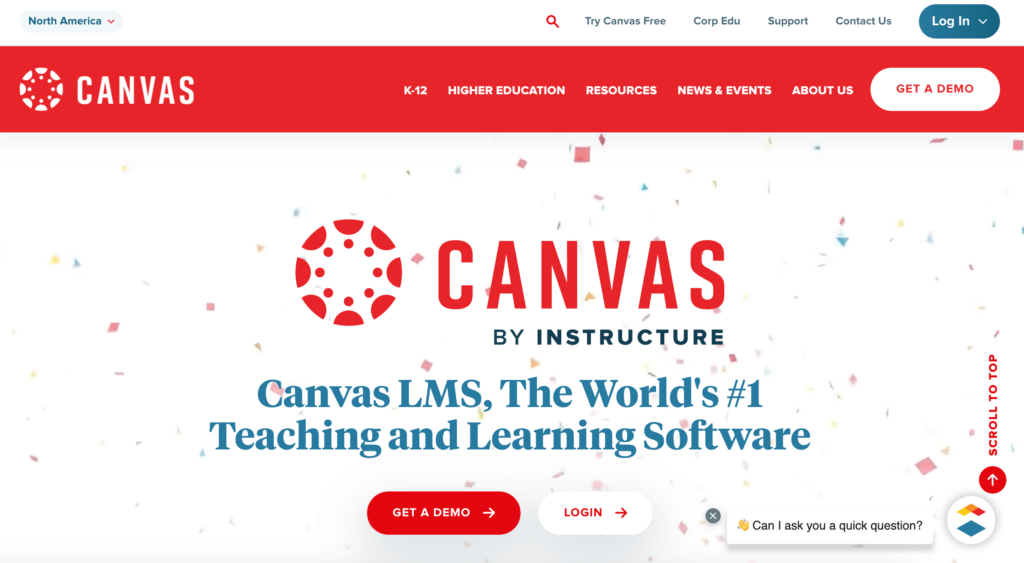
2.Email Marketing
Crafting an effective email marketing strategy for EdTech is crucial for building strong connections with learners. And the essence of a successful email campaign for EdTech lies in tailoring communications to meet the unique needs and interests of each recipient.
Let’s see the most important and effective email marketing strategies for EdTech companies:
Personalized Communication
Personalizing emails based on the learner’s profile, course interests, and learning style significantly enhances engagement.
For example, platforms like Coursera customize messaging based on the courses a learner is interested in, whether it’s creative writing or software coding. This strategy boosts conversions by making emails more relevant to the recipient.
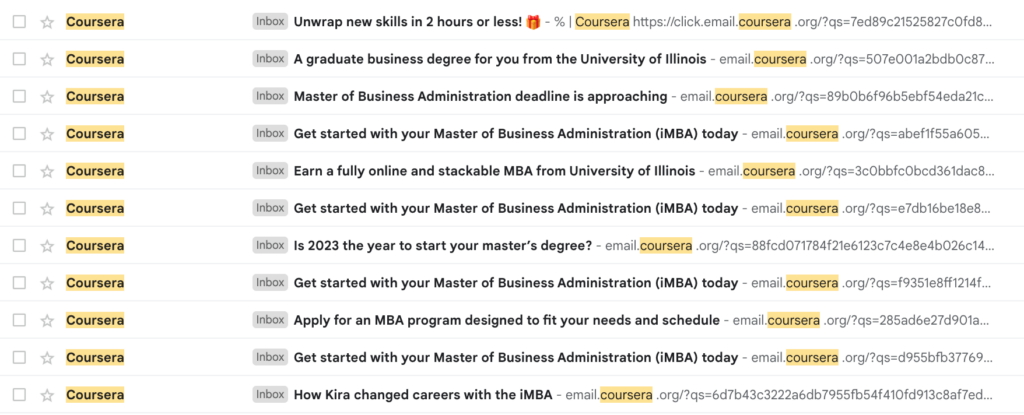
Empathy and Understanding
Building strong customer relationships by benefiting from email marketing involves deeply understanding and empathizing with learners’ needs.
By actively seeking and incorporating user feedback into your communications, you can mention the specific challenges and preferences they shared with you. This way, you can make your emails resonate with your audience better, and consequently, have a higher conversion rate!
Moreover, you can share testimonials and success stories in your emails to enhance your brand’s trustworthiness and credibility. This approach shows your commitment to meeting learners where they are, ultimately strengthening the connection you have with your audience.
Email Automation
Email automation is a must to combine education marketing with tech marketing to successfully engage learners. Using email automation tools like Mailchimp, HubSpot, or Salesforce Marketing Cloud, you can send targeted emails triggered by specific actions, such as course inquiries or cart abandonment.
This strategy, tailored to discounts or course reminders, can boost your open and click-through rates by re-engaging learners at critical moments.
An example of all these email strategies in action is Toppr, an Indian after-school learning app, which saw a 133% uplift in conversions through personalized email campaigns.
Another example is Mero School, an online learning platform that achieved an 80% increase in their known-to-unknown user base conversion through effective email marketing.
P.S.: Don’t forget to include clear unsubscribe buttons in every email you send so as not to cause a bad perception of your EdTech business.
3.Video Marketing
As video marketing is a separable element of any niche being marketed in our digital world, EdTech video marketing requires a solid understanding and implementation of video marketing.
Here are some strategies and real-world examples of how EdTech companies are effectively using video marketing:
Educational How-to Videos and Tutorials
For instance, an online education platform, Domestika, shares videos on their YouTube account. They offer a variety of educational, promotional, and tutorial content featuring the brand consistently throughout their content. This way, they not only attract potential learners but also demonstrate to new educators how qualified their company as a workplace is.
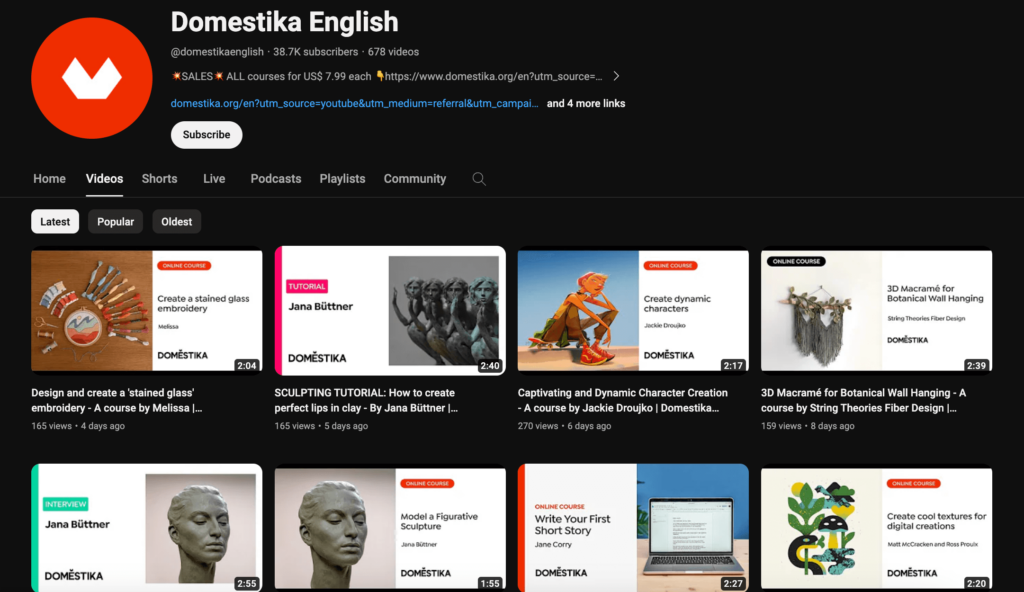
Student and Instructor Testimonials
Numerous EdTech companies, as part of their video marketing strategies, often create videos telling stories of how previous users solved their pain points and benefited from the platform.
These videos prove that if prospective users choose their services, they can write their own success stories.
For instance, Udemy effectively uses YouTube to share testimonials; here’s one of them, “From Udemy student to software engineer”:
Utilizing Various Platforms
Not only YouTube but also platforms like Instagram, Facebook, TikTok, etc. are effective and good to use for EdTech video marketing depending on the target audience’s demographics.
YouTube, for instance, with its vast user base from a wide range of user profiles, is an ideal platform for EdTech companies to market their products and services through videos. However, Instagram also stands out as a great platform for Edtech digital marketing, similar to YouTube.
Udemy, leverages both YouTube and Instagram, for instance:
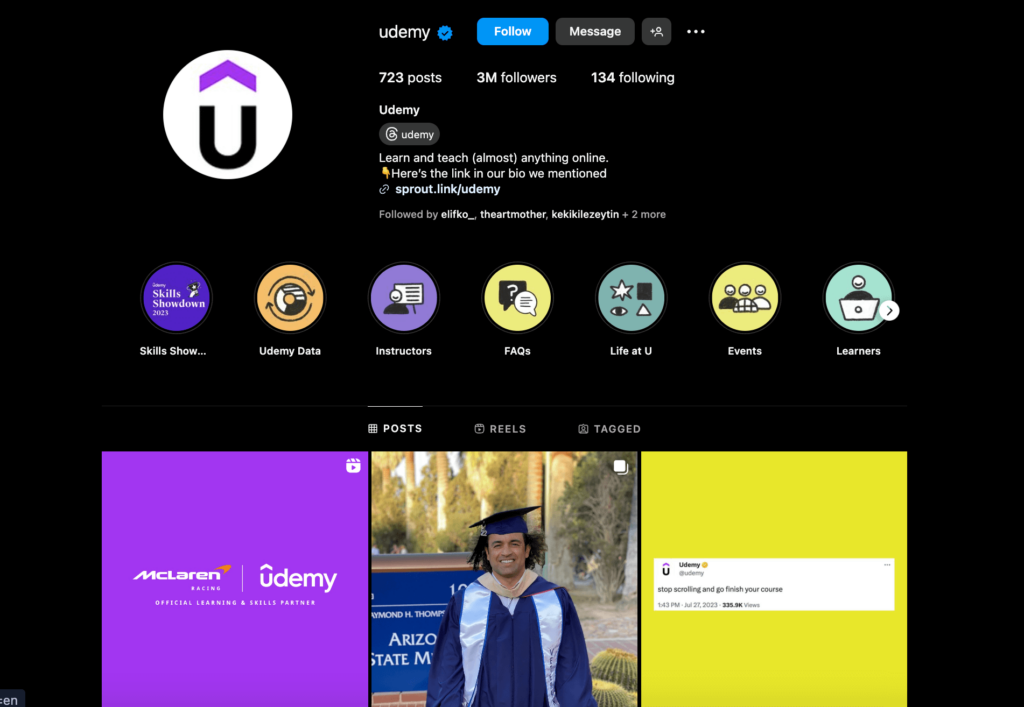
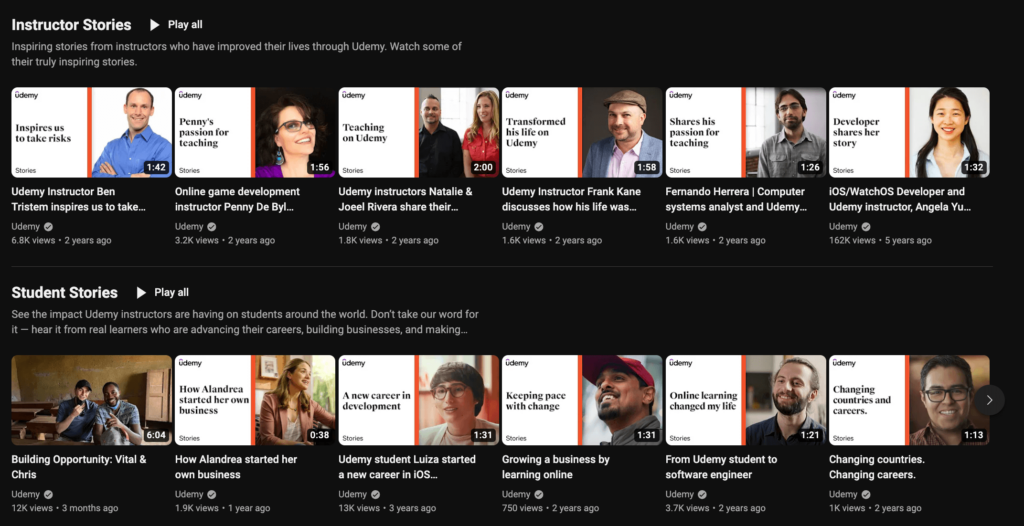
4.Social Media Strategies
Social media platforms play a significant role in EdTech marketing strategies:
Platform-Specific Content
EdTech companies often share short and engaging educational videos on Instagram and TikTok while focusing on creating long and informative YouTube videos. Such differentiation may seem time-consuming but this is how education marketing agencies can handle the creation and distribution of social media content for you easily.
Let’s see some examples of platform-specific content:
@edx Does this mean I'll get a raise when I return? 🤗 #edX #edXTaughtMe #edutok #corporatelife #corporatehumor ♬ Jennifer Coolidge is Heartbroken – The Meme Stream
With the TikTok video above, edX makes sure that the users of TikTok looking for fun and maybe cheesy content easily consume their videos. However, on YouTube, the same EdTech company goes for “more serious” videos:
Community Engagement
Try to share content, which can create buzz. With this type of content, your main aim should be to attract more people into writing comments, including oppositions of course, and reposting what you share to support, refute, or make a balanced commentary.
For example, Udemy shares highly engaging posts that seduce users to reply. Here’s one of them:
my toxic trait:
— Udemy (@udemy) January 26, 2024
buying more udemy courses when i haven't finished my last 5
Another good example of the strategy of inviting users to reply and repost is Coursera’s direct question to its target:
If you could try any job for a day, what would it be? 🧑⚕️👷🕵️
— Coursera (@coursera) January 26, 2024
So, diving into this niche with a solid digital marketing strategy for EdTech EdTech tailored for this sector is non-negotiable.
To sum up, let’s say one more time that harnessing the power of targeted approaches, from personalized emails to engaging social media campaigns, can transform how learners connect with your offerings. Also, engaging with education or tech marketing agencies can make sure that you see the outcomes of your efforts quickly.
Don’t forget to embrace the digital trends, from AI and automation to community building on social media and SEO, and watch as your EdTech platform not only reaches but resonates with more students than ever before.
Ready to revolutionize learning? Your digital marketing journey in EdTech starts now.














